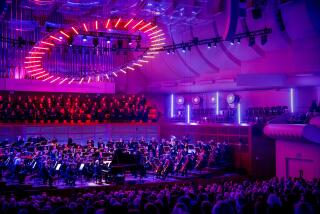Music Reviews : The Dark Side of the Borodin Quartet
- Share via
The Borodin String Quartet of Moscow demanded much of itself and of its audience at Beckman Auditorium on Sunday.
To say that the program projected Russian gloom would be an understatement. Even the supposedly lighthearted opener, Prokofiev’s folksy Second Quartet, found the players more intent on probing its darker corners than its whimsy.
But the performance was pure Borodin, displaying the fabulous control, internal balance and richness of tone that the group has consistently provided us in the two decades of its present membership: violinists Mikhail Kopelman and Andrei Abramenkov, violist Dmitri Shebalin, cellist Valentin Berlinsky.
Darkness dominates the Third Quartet (1983), a typically off-the-wall creation by Alfred Schnittke, with its centuries-hopping borrowings from other composers, formal freedom, dense textures and air of quiet--occasionally noisy--desperation.
Gripping stuff in a merely decent performance, it becomes frightening in the hands of these masters.
There was no relief after intermission, with the presentation of a Borodin signature piece, the 1974 Quartet No. 15 of Dmitri Shostakovich, his last: six connected slow movements, all in the Stygian key of E-flat minor, seldom becoming louder than soft. As is the habit of these performers, it was played by candlelight.
The sizable Coleman Concerts audience proved remarkably attentive as the lengthy score withdrew ever deeper into its pained shadow world and, ultimately, extinction--of the music, the candles and, metaphorically, the composer’s life.
Then, in an anticlimactic gesture that surely shocked those who had not witnessed the same ritual a few years ago, when the Borodins presented their memorable Shostakovich quartet cycle at Ambassador Auditorium, the house lights were rekindled and the players proceeded to give us yet another Shostakovich slow movement, the “Elegia” from his Eleventh Quartet.
More to Read
The biggest entertainment stories
Get our big stories about Hollywood, film, television, music, arts, culture and more right in your inbox as soon as they publish.
You may occasionally receive promotional content from the Los Angeles Times.










